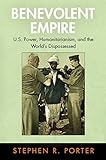Benevolent Empire : U.S. Power, Humanitarianism, and the World's Dispossessed / Stephen R. Porter.
Material type: TextSeries: Pennsylvania Studies in Human RightsPublisher: Philadelphia : University of Pennsylvania Press, [2016]Copyright date: ©2017Description: 1 online resource (296 p.) : 10 illusContent type:
TextSeries: Pennsylvania Studies in Human RightsPublisher: Philadelphia : University of Pennsylvania Press, [2016]Copyright date: ©2017Description: 1 online resource (296 p.) : 10 illusContent type: - 9780812248562
- 9780812293296
- 323.631 23
- JV6601 .P67 2017
- online - DeGruyter
- Issued also in print.
| Item type | Current library | Call number | URL | Status | Notes | Barcode | |
|---|---|---|---|---|---|---|---|
 eBook
eBook
|
Biblioteca "Angelicum" Pont. Univ. S.Tommaso d'Aquino Nuvola online | online - DeGruyter (Browse shelf(Opens below)) | Online access | Not for loan (Accesso limitato) | Accesso per gli utenti autorizzati / Access for authorized users | (dgr)9780812293296 |
Frontmatter -- Contents -- Introduction -- Chapter 1. a new Benevolent Empire? -- Chapter 2. Refugees in the shadow of the new deal -- Chapter 3. Recruiting Philanthropies for Battle -- Chapter 4. Benevolent or fair superpower? -- Chapter 5. State of voluntarism for Hungarians? -- Chapter 6. Freedom fighters on the american Home front -- Chapter 7. Revolutions in Cuba and Refugee Welfare -- Epilogue -- List of abbreviations -- Notes -- Index -- Acknowledgments
restricted access online access with authorization star
http://purl.org/coar/access_right/c_16ec
Stephen Porter's Benevolent Empire examines political-refugee aid initiatives and related humanitarian endeavors led by American people and institutions from World War I through the Cold War, opening an important window onto the "short American century." Chronicling both international relief efforts and domestic resettlement programs aimed at dispossessed people from Europe, Latin America, and East Asia, Porter asks how, why, and with what effects American actors took responsibility for millions of victims of war, persecution, and political upheaval during these decades. Diverse forces within the American state and civil society directed these endeavors through public-private governing arrangements, a dynamic yielding both benefits and liabilities. Motivated by a variety of geopolitical, ethical, and cultural reasons, these advocates for humanitarian action typically shared a desire to portray the United States, to the American people and international audiences, as an exceptional, benevolent world power whose objects of concern might potentially include any vulnerable people across the globe. And though reality almost always fell short of that idealized vision, Porter argues that this omnivorous philanthropic energy helped propel and steer the ascendance of the United States to its position of elite global power.The messaging and administration of refugee aid initiatives informed key dimensions of American and international history during this period, including U.S. foreign relations, international humanitarianism and human rights, global migration and citizenship, and American political development and social relations at home. Benevolent Empire is thus simultaneously a history of the United States and the world beyond.
Issued also in print.
Mode of access: Internet via World Wide Web.
In English.
Description based on online resource; title from PDF title page (publisher's Web site, viewed 30. Aug 2021)


